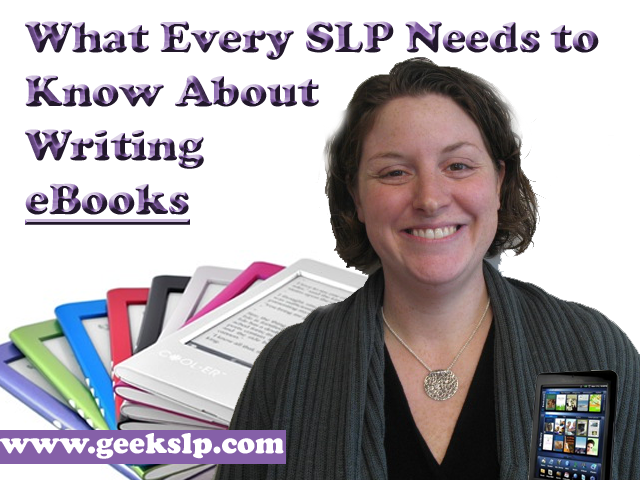
![Jena Casbon]() Writing My First eBook
Writing My First eBook
After practicing as a Speech-Language Pathologist for almost three years, I became interested in treating private patients. I had many colleagues who were successfully treating a few patients a week “on the side” and doing quite well with it. I realized that there was a demand for my services and that I could provide skilled therapy for patients for whom health insurance would no longer cover. I was lucky to have excellent mentors who taught me the in’s and out’s of private therapy. When I went onto Amazon.com, ASHA, etc. to find more information about private patients, I was stunned that no such “how to” guidebook existed.
I decided that my new focus in life should be on both helping those affected by speech, language, cognitive and swallowing disorders and on helping the those who provide care to them (SLP’s, OT’s and PT’s). I decided to write the book that didn’t exist, which is how my eBook, The Independent Clinician Guide to Private Patients was born.
What is an eBook and Why Should You Write One?
Simple put: an eBook is a digitally downloaded copy of a book that can range in length from 10 – 100+ pages. While not everyone is comfortable buying products online or downloading files, the majority of today’s computer users are very technologically savvy. The instant gratification that buying an eBook and having it within your possession within seconds brings, is irresistible to people who are motivated and ready to take action and get their problem solved.
Writing an eBook is an excellent way to stand out from the crowd by becoming a recognized authority on a given subject. Being a published author (self-published counts too!) shows patients, families, colleagues and other professionals that you are serious about what you do and have developed a certain level of expertise.
What Should You Write About?
Before you sit down to write your eBook, you need to pick a subject to write about. The following two criteria need to be met:
- You need to have a clinical or practical expertise in the subject
- You need to be fulfilling a need that does not exist
Simply put, no one wants to spend money on something that is not worth it. If you’re going to write a book and charge for it, you better know what you’re talking about.
When I wrote The Independent Clinician Guide to Private Patients I was fulfilling a need that existed: there was no “how to guide” for treating private patients. What kind of information gap do you see? There are certain aspects of our field that are becoming saturated in the marketplace: gluten free diets for kids with autism, baby sign language, etc. Your challenge is to find an area that has not been well documented but where patients, families or colleagues are hungry for information, then give it to them.
How Much Is Your eBook worth?
People are willing to pay money to solve their problems. With 34% of Americans being clinically obese, weight loss books, dietary supplements, etc. make 55 billion dollars a year annually. People don’t like being overweight and are willing to spend money to fix their problems.
If you’re able to give truly helpful explanations, advice, guidelines, tips, step-by-step examples, etc. of how to deal with and fix a problem, people will pay for that information. If you want to sell your eBook, consider the following:
- how valuable/relevant is the information
- how scarce is the information (you can charge more if the availability of info is scarce)
- how lengthy is the book
- how much time and energy did it take to write
- how much does the buyer think it’s worth
We have all bought things that in retrospect are feel we paid to much for. Don’t let your eBook be one of those things!
I decided to price my eBook at $49.95. The decision was made based on the criteria above, as well on feeling like anyone who bought the book and put the steps into action could easily recoup the money in one private treatment session. Because the $49.95 book can easily bring you thousands of dollars a year in income, most people feel that the price is very fair. Also, being just under the $50 mark psychologically makes it seem more affordable than if it was an even $50.
How to Design a Nice-Looking eBook
The adage about “judging a book by it’s cover” is incredibly important with eBooks. Because the customer cannot look inside the book, like they could at a bookstore, you need to make sure the book is professional looking and enticing to your customer. The first few months of selling my eBook, I was using a cover that I designed myself aka it looked terrible. Because we are Speech-Language Pathologists, not graphic designers, we really should hire someone to do his for us. I used a freelance graphic designer and book formatter from www.eLance.com to design my book cover and fix my layouts. For about $100 a woman in India created a great cover design and cleaned up the layout of my eBook. The money was well-spent.
Getting Your eBook to the Market
The best way to sell your eBook is via your website. My website is hosted with a company called www.FatCow.com. FatCow is a funny name, but they are very easy to use and work with. For $78/year you can have a great site on FatCow. You can choose to sell your eBook on your own website or on a website dedicated specifically to your eBook. You do need to have some advanced computer skills to know how to put a link on your site to actually purchase the book. Two things are at work here: you need a company to actually take the credit card information from your buyer and you need a company that will handle the delivery of your eBook.
I use www.PayPal.com as the company that takes the credit card information from my buyers and www.e-Junkie.com as the company that hosts my eBook and sends an e-mail with a download link to the customer as soon as the sale has gone through. PaypPal takes a small cut (around 2%) and e-Junkie costs $5/month to handle your eBook.
Of note, FatCow, PayPal and e-Junkie all have EXCELLENT customer service centers that will help you get everything up and running. If you’re having a problem, either calling them or using their LiveChat customer service options are very helpful 🙂
11 Marketing Strategies That Won’t Cost a Penny
After you write your eBook you want to be able to sell it! I don’t like to pay for marketing, so I have used free marketing strategies to sell my eBook. Here are some ways to promote your eBook without spending any money!
- Add it to your existing website
- Tell your patients, families, colleagues about your eBook
- Put a link in the signature of your website
- Put a link in your Facebook, Twitter or Linked In profile
- Tell your Facebook, Twitter and Linked In friends about your eBook
- Write (helpful!) comments on peoples blogs with a link to your site
- Write (helpful!) comments on forums with a link to your site
- Offer to guest blog on other sites with your contact information for people to follow
- Get in touch with other SLP’s who have written eBooks and ask them to tell their friends/followers about your eBook in exchange for you doing the same
- Start a blog that offers free information on your eBooks topic with a link to purchase the eBook for more in-depth information
- Word of mouth advertising: provide a great product that satisfied customers will tell others about
Keep in mind that building up your fans and sales takes months if not years. If you put in the time to create a quality eBook and you tell enough people about it, it will eventually catch on. Writing my eBook and starting my blog on www.IndependentClinician.com has been one of the most professionally and personally rewarding experiences of my life.
Jena’s Resources for Writing Your eBook
- eLance: Find someone who can design a nice cover and layout for your eBook
- FatCow: My recommendation for your website
- PayPal: Handles the monetary transaction for your eBook
- e-Junkie: The payment processor and delivery mechanism for your eBook
*I personally use each of the above mentioned products/services. If you have a question about any of them, don’t hesitate to ask me –> independentclinician@gmail.com
__________________________________
Jena H. Casbon, MS CCC-SLP is a Speech-Language Pathologist and founder of The Independent Clinician. After graduating from graduate school at Emerson College in Boston, she has worked with adult outpatients in a rehabilitation hospital and inpatients in a skilled nursing facility. Three years into practicing as an SLP, she began treating private patients- but the lack of a “how-to guide” bothered her, so she wrote one, which is how The Independent Clinician Guide to Private Patients came to be.
Visit http://www.IndependentClinician.com to learn more about how to treat private patients.


